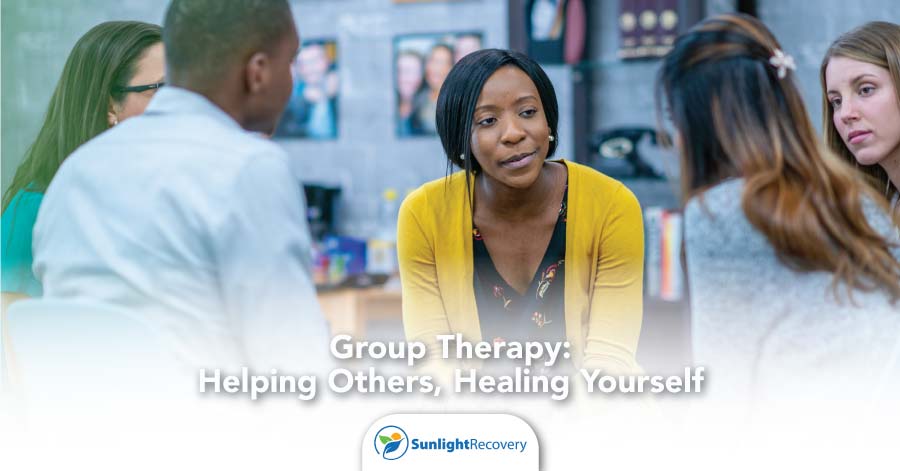Admitting that you have an addiction is incredibly difficult. You may feel like you are the only one in the world struggling with it, and that if you talk about it, others might shame you. But there are people out there who know exactly what you are dealing with and through group therapy you can hear such individuals speak their truths and ask compassionately about yours.
What is Group Psychotherapy?
Group therapy usually involves around 5 to 15 people, but can be much larger, and are sometimes led by a psychologist or two. The professional is tasked with mediating, as within the group people will take turns sharing their stories and asking other people questions.
There are a variety of ways that group therapy is conducted. It may take place in a church, community building, or treatment center. Everyone in the group could be struggling with the same addiction or each individual has a particular problem. You could be going for substance abuse treatment while another member is addressing his or her chronic pain.
Despite this, you can compare and contrast your experiences. Some groups meet for an hour or two weekly, while others occur on a more regular basis. The great thing about group therapy is that you can get from it what you want. It is a place to improve social skills, as you have to learn how to communicate, respond, and be patient. Also, it can be utilized as a treatment alongside individual therapy to produce the best results and reduce relapse rates. Group therapy is particularly useful for dealing with death, regardless of who died and the manner in which they died, since there is group support for your grief.
Helping Others and Yourself
Twelve-step programs are implemented by many organizations and perhaps are the most widely known method of organizing group therapy. It has been made rather well known by groups like Alcoholics Anonymous and Celebrate Recovery. Alcoholics Anonymous owes much of its success to being conducted in a group therapy format. Addicts are able to come and see all the other people that are contending with the same exact disease. They make everyone feel less ashamed of their struggles and a greater sense of feeling understood.
As expected with AA and all other group meetings, you can share your history. Where did your struggles begin? Do you have an addiction? Why do you have that addiction? All of these questions can be posed and answered within a gathering of people in group therapy. The twelve steps adhered to by AA are:
- Admit you are powerlessness over the addiction
- Believe there is a higher power that can help
- Decide to relinquish control to that higher power
- Take a personal inventory of oneself
- Admit to oneself, another individual, and higher power what wrongdoing has been done
- Be ready for the higher power to come in and correct any of your shortcomings
- Ask the higher power to get rid of those shortcomings
- Make a list of wrongdoings and be willing to make amends to yourself and others
- Contact those who have been hurt, unless that would further harm them
- Continue to record a personal inventory and admit when you make other mistakes
- Use prayer and meditation to seek enlightenment and connection with a higher power
- Pass on the message of the 12-Step Program to those in need
One of the effective things about these guidelines for group therapy is that they get the attendants to admit their issues, which is often the most vital and difficult step towards treatment. The very first step helps to put many people at ease, showing them that they are not defined by their disease, they are not past the point of treatment, and nothing is their fault. The steps empower participants to be more observant of their negative behaviors so they know how to best change them, using a personal inventory to keep track. The steps are obviously also not just centered on you. They encourage you to heal all past wounded relationships, be there for the other people in the group, and to take on the good word of group therapy to others struggling.
Celebrate Recovery essentially employs the same set of steps with a religious element to it. This is specifically catered for those wanting to solidify their faith, relationship with God, and to make spiritual connections. Another characteristic of the twelve steps is that they can be applied to every addiction and are interchangeable, so you can alter them to your needs. Often times, participants in group therapy will have sponsors personally invested in their recovery who will be there during times of relapse to make sure that you continue treatment. This is a deeply intimate relationship and it can be helpful to know that both your sponsor and group members are invested.
Things to Consider
The idea of joining a group, whether it is composed of strangers or acquaintances from your community, can be intimidating. But know that it can be a hugely rewarding experience if you can get past the initial fear. Group therapy allows you to say things you’ve been bottling up on the inside, things you may had hid from family and friends. Everyone there is struggling and no one person is above another. You can hear about people who are all ages, races, genders, and economic classes dealing with issues.
Some people may be early into their addiction, others many years deep. No matter what, hearing their stories gives perspective and maybe even clarity to your own background. Group members can help you to come up with ways to help you get through your situation and keep you accountable. A psychologist present could provide the professional opinion about medications and what not. They both are there to also keep you accountable for your actions and words.
When picking a group to join, maybe consult a medical professional for options prior. You are not bound by contract in group therapy and so this gives you the flexibility to try out different crowds and see where you are comfortable. Pick a small group if you want more honed in attention on every individual or a large group if that is less pressure. No matter how many people there are, remember that confidentiality is a key component to group therapy. You are expected to afford other’s the privacy you wish to have. There needs to be open and honest conversation, so never give anyone the impression that you cannot keep their secret and also do not worry about oversharing. Group therapy is a gradual process and you will adapt to it as you see fit.
Contact Sunlight Recovery
With Celebrate Recovery and Alcoholics Anonymous as examples, group therapy is clearly one of the more popular forms of rehabilitation. While each group will differ depending on location or the addiction being addressed, such a treatment method encourages you to seek help for not only yourself but also to support your fellow members in their pursuit of recovery.
If you or someone you know wants to find out more about the possibilities of group therapy and the services we provide, please contact Sunlight Recovery at 844-426-0790 for assistance.







Leave A Comment